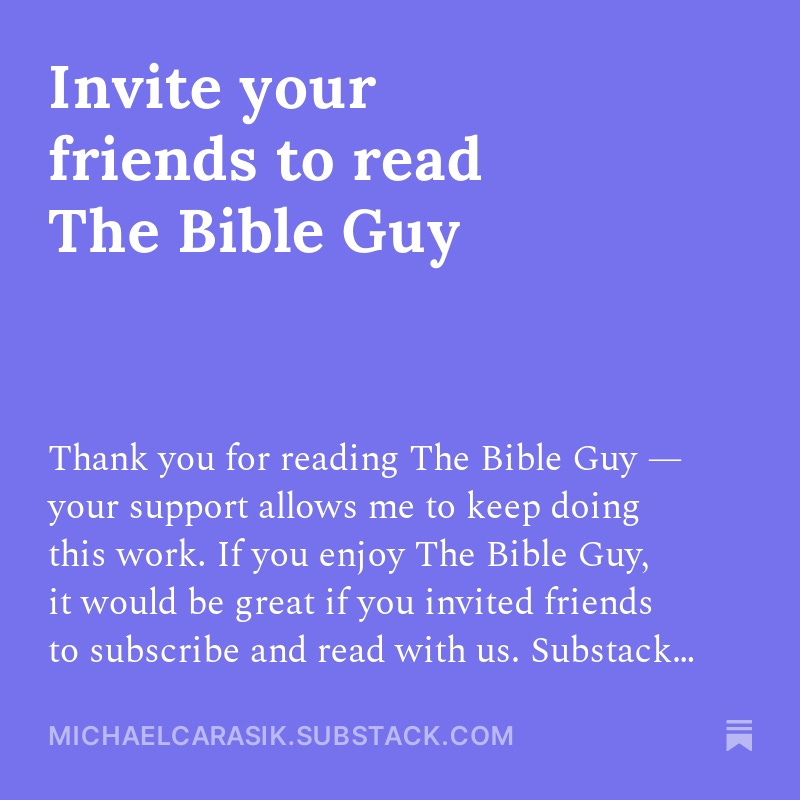Here’s a quote from Lawrence Wills’ recent book, Introduction to the Apocrypha (hat tip to Malka Simkovich’s review of it in the Jewish Review of Books): “If different religious traditions grant authority to a Bible as a sort of constitution, the extra texts then indicate a shadow zone where the constitution is negotiated or expanded.”
The Apocrypha, of course, as Wills’ subtitle explains, are “extra” in the sense that they are “Jewish Books in Christian Bibles.” They are not considered biblical by Jews and are not really read by Jews (though one of them, Ecclesiasticus or the Book of Ben Sira, is occasionally quoted in the Talmud as if it were part of the Bible). You can read these books, and more about them from a Jewish perspective, in The Jewish Annotated Apocrypha, by Wills and Jonathan Klawans.
But the remark got me thinking. Exactly which religious traditions are they, that “grant authority to a Bible as a sort of constitution”?
My model for a constitution, of course, is our United States Constitution, fashioned a few blocks from where I sit, in Philadelphia. Do read Catherine Drinker Bowen’s Miracle at Philadelphia for a charming version of the story of how it was created, and then go to the website of the National Constitution Center, a few blocks north of Independence Hall, for a deeper dive.
The U.S. Constitution tells you (in the preamble) what its purpose is, and then outlines the rules for running the country that will go into effect if accepted by enough of the states previously belonging to “the United States of North America,” organized under the Articles of Confederation. The Bible is nothing like this.
The Bible begins with the words, “When God began to create heaven and earth …” or something of the kind. (See the current series on my new Bible Guy Substack for an intense discussion of these words, starting here.) If the Constitution had resembled the biblical model, it would have had to start something like this: “When, in the course of human events, it becomes necessary becomes necessary for one people to dissolve the political bands which have connected them with another …” Whoops, that’s the Declaration of Independence.
Speaking just from a Jewish perspective, and about the Jewish Bible (on the differences between Bibles, see here and here), we don’t treat it like a constitution. Wills does note, in his chapter on historical texts: “In 1 Maccabees Judaism is sometimes described in political terms, with the law of Moses as a constitution” – using the Greek word πολιτεία. Jonathan Goldstein’s Anchor Bible commentary notes, “Jewish Greeks, including Philo and Josephus, had no trouble using the Greek word politeia (‘constitution,’ ‘republic,’ ‘citizenship,’ or ‘civic institution’) for the law of the Torah.”
But those Jewish Greeks left little trace in Jewish thought. If I had to identify a Jewish “constitution,” it would be the Mishnah. It’s the Mishnah that outlines how Judaism, including the Jewish state it imagined would come back into being, is supposed to work. The Mishnah gave its shape to the Talmud, and in more complicated ways to the Shulhan Arukh, which might be called the “active” constitution of today’s Judaism — to the extent that there is one.
That leaves a nagging question: What exactly is the Bible? That is, what kind of book is it? What is its function in the Judaism of today, if it is not a constitution? Is the Bible the constitution, if not of the Jews, then of Protestant or Catholic Christians?
I won’t presume to answer that question, but I’m remembering a story that Daniel Harrington told at Penn, when he, Marc Brettler, and Peter Enns came to introduce their book, The Bible and the Believer. A Jehovah’s Witness team came to their door when he was a kid, and asked his mother, “Could we talk to you about the Bible?” His mother answered — her voice, as he reenacted the story, dripping with scorn — “We’re Catholic. We don’t read the Biiiiible.”
So I don’t imagine “constitution” is the correct word to describe how Catholics “grant authority to the Bible.” There’s such a wide variety of Protestantism, about which I know fairly little, that I won’t presume to say whether this is true for them as well. But I’ll venture so far as to say that if the book tells you not to eat bacon and you eat bacon anyway, that book may be a lot of things, but not a constitution.
That still leaves open the question of what kind of writing the Bible actually is — not intrinsically, but what kind of book the various religions treat it as. My impression is that Christians think of the Bible as a whole as a message to humanity from God. Jews, I believe, treat it more as the story of our relationship with God.
Whether it is a message or a story, the Bible is not really a single book – it is a library. It contains legends, laws, history, poetry, and wisdom. But you can heft a single volume in your hand and call it a Bible. What kind of book is that Bible, as a book?
The easiest, most straightforward, and perhaps most accurate answer to what kind of book the Bible is would be to say: It is a Bible. This may sound tautological, but it isn’t, quite. Books in other areas of life may be called The Fisherman’s Bible, The Poker Player’s Bible, The Beer Can Collector’s Bible, and so on. That’s because the Bible is somehow thought of as comprehensive. Its nature as a collection is what originally made it so.
And a Jewish Bible is actually much more likely to be a multi-volume set rather than a single “book.” What really happened is that scrolls were replaced by a new technology called the codex, and that created “the Bible.” Deciding what kind of book a Bible is came afterward.

